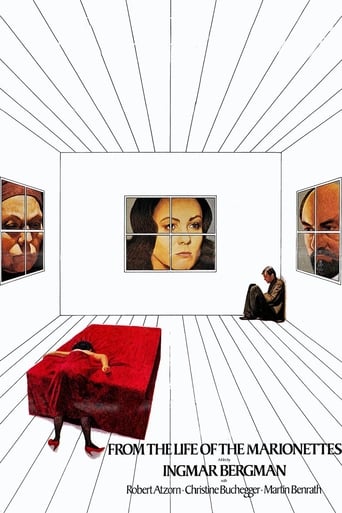MisterWhiplash
Ingmar Bergman's From the Life of the Marionettes, his last film done while in exile during the late 70's, hearkens back to his experimental period in the mid to late 60's. Here he's trying for a deconstructive way to get inside the mind of his subjects, most notably the character of Peter Egermann. The fatal flaw of the film, however, is also something that adds an unusual kind of connection to the material for a Bergman film. It's erratic in its narrative as the director tests himself with jumping around from different times around a single event. But unlike how this has been done by the likes of Tarantino, this is meant not really as a useful story trick, but to try to get different perspectives and acute angles of the subject at hand. The film doesn't reach its greatness for the same reason that it does keep itself watchable- this is very murky, depressing times, loaded with dialog that may or may not go ways to help explain or give some interest in the supporting/main characters, and some startling, if dated, surreal experiences.It's also a little strange that Bergman decided to connect these characters, however loosely, to the couple in the first episode of the Scenes From a Marriage series, where Peter and Katarina (then played by Jan Maljsmo and Bibi Andersson) were the volatile arguers who juxtaposed the main focus of the film. Here, portrayed by Robert Atzorn and Christine Buchegger, are not only not as spot-on as the former actors (though they are still quite good and splendid in some scenes), the couple is picked under Bergman's psychological microscope where the relationship is very strained and a fatalistic. The opening scene is definitely a mind-blower, with an intensity and harsh sexual edge that is uncommon to Bergman's films (one of his best openings to be sure). Indeed, one of the nice twists, a little shocking at first and then intriguing, is how the filmmaker lets out inhibitions and shows the more explicit images of nudity and the sensual, as well as rock and disco music.Along with a fragmented approach to the storytelling, where infidelities, insecurities, shame, depression, and outright rage and confusion are brought out in segments that range from the convincing to missing the mark. In a way, maybe Bergman's aims are lowered this time in exile, and he delves more into a doomed personality with visual surprise. Sven Nyvkist, as usual, is still very good with what he does in the frame, especially as this is 90% black and white (with a strange blue tint at times), and his services come into great use in a visual detailing of a dream involving Peter and Katarina naked in a wide, white space. It's maybe the best sequence in the film. In experimenting with the dramatic interpretations, it's not as successful, and some of the supporting actors aren't as good as the leads (a scene with one of the actors talking into a mirror is one of my least favorite scenes Bergman's ever wrote/directed). Its obscurity is not, therefore, that staggering to see. But it is a good and occasionally spine-tingling character study, and if you are into the filmmaker's work already it's a find that might prove better or more fulfilling. 7.5/10
Claudio Carvalho
The story begins in colors with the violent murder of a prostitute followed by necrophilism by Peter Egermann (Robert Atzorn). Through the investigation, in black & white, the investigator interviews Peter's wife, the beautiful designer Katarina Egermann (Christine Buchegger), his doctor, his mother and some friends, and realizes that Peter is an unsecured man, who has never controlled his own life. His doctor's report indicates that Peter had a breakdown. In the colored epilog, Peter is in his cell, in a mental institution, observed by his wife and his nurse. This dark and disturbing psychological movie is very depressive. I am a fan of Ingmar Bergman, the interpretations and direction are excellent, as usual, but I did not like this complex story. My vote is seven.Title (Brazil): `Da Vida das Marionetes ` (`From the Life of the Marionettes')
Bob Taylor
Bergman's working with a very restricted palette here, as he did with The Rite or Winter Light. The romantic, funny touches you expect from him are missing. Peter's mind is crumbling; he's a modern Othello obsessed with his wife's fidelity amid the tasteful furniture of their elegant home. All the action is seen through the distorting lens of Peter's madness. Why would his wife say, in front of strangers, that she has to get drunk to steady her nerves at her mother-in-law's place? This is the disturbed mind at work.The acting is fine. Robert Atzorn and Walter Schmidinger do very well as, essentially, two sides of the same coin (the stodgy businessman and the gay fashion designer). Christina Buchegger is wonderful as Katharina, the wife; her attempts to win out over Peter's psychosis give the film what drama it has.
erick_castaway
The best thing about this movie, is not only it's photography, nor it's characters. It's the best story telling ever, using the flash forward - flash back resource it keeps your mind trying to put together this extraordinary puzzle. Bergman did this before Tarantino's Pulp Fiction. And keeps it in an intimate level, wanders in the dark pits of human sexuality and feelings. So... watch the film with open mind.


